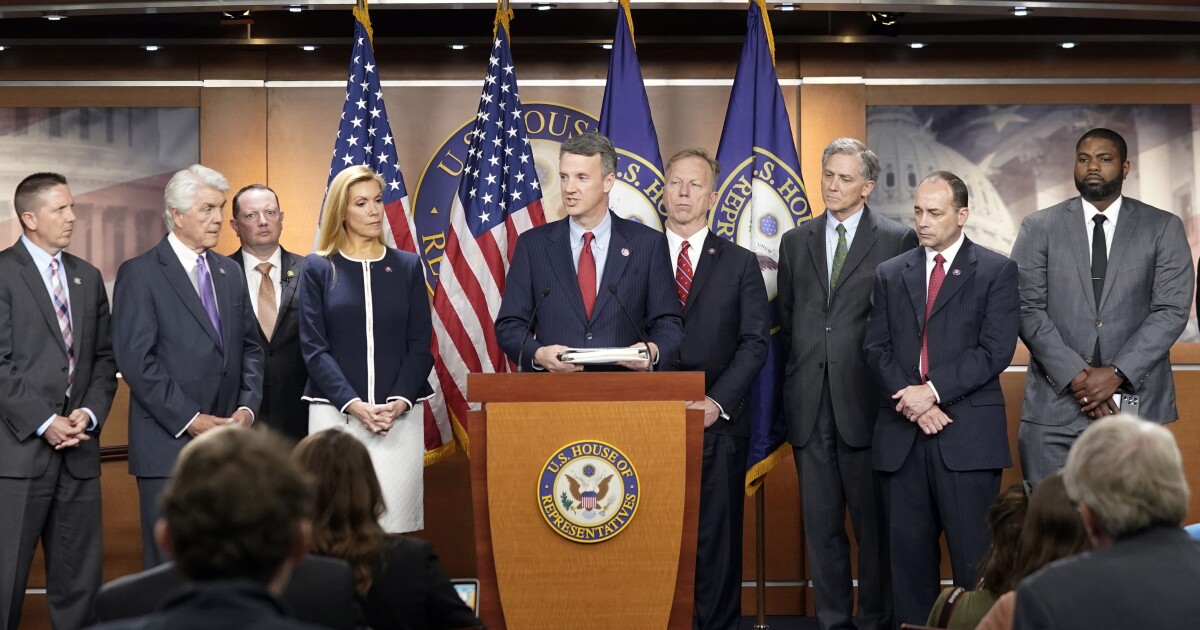

EXCLUSIVE — The Republican Study Committee outlined its priorities on funding for the Department of Health and Human Services and the reauthorization of the Centers for Disease Control and Prevention and the Pandemic and All-Hazards Preparedness Act.
On top of all the other things Congress must do when it returns from August recess, lawmakers must also address a litany of public health-related pieces of legislation, including funding and reauthorizing a number of programs and agencies. The Washington Examiner obtained a memo the RSC plans to circulate to its members that lays out its priorities for these bills.
HARRIS STEPS INTO THE SPOTLIGHT WITH BIDEN AT THE BEACH
The memo says that following the government overreach that occurred during the COVID-19 pandemic, Congress has a “responsibility to rein in the federal bureaucracy’s overreach in public health.”
The memo urges the members to push for Congress to do this by ensuring that agencies and programs are authorized and funded “within strict public health parameters and cut funding for any office, program, or official that falls outside of those parameters.”
In the memo, the RSC calls for Congress to “stop funding nonsense” by eliminating or defunding “unnecessary offices or positions” within public health agencies. These offices and positions include the Office of Climate Change and Health Equity at HHS, the Office of Diversity Equity and Inclusion at the National Institutes of Health, and the Office of Health Equity at both the CDC and the Health Resources and Services Administration.
Another priority is ensuring that unconstitutional mandates, regulations, and guidance are avoided by setting “prohibitions on funds” for these programs.
“Conservatives should offer policies to ensure the American people are never again subject to the mandates and runaway spending that were thrust upon them in the name of COVID,” the memo reads. “Since America’s public health officials and institutions have revealed they will run amok when allowed, it is clear Congress must do better to clearly define their goals and authorities.”
They also call for Congress to direct agencies tasked with buying medical countermeasures and addressing the medical supply chain to do that in this year’s reauthorization as opposed to spending money on “leftist priorities and restrictions on liberties.”
The Pandemic and All-Hazards Preparedness Act was established in 2006 and implemented a national federal health preparedness and response plan. Congress reauthorized the legislation in 2013 and 2019, with the current law set to expire at the end of September.
“Congress must assert its role and constitutional responsibility by legislating that process as part of the new Pandemics and All-Hazards Preparedness Act (PAHPA) reauthorization,” the memo reads. “Private industry and good market principles can ensure that Americans have access to the medical countermeasures they need, when they need it, without relying on bloated bureaucracy and wasteful hoarding of medical material.”
They also want to “rein in the CDC” by establishing a “definition of public health, guided by principles of good governance” by authorizing the CDC for the first time since its inception within strict boundaries. The RSC wants to see the CDC decentralized and shifted to serve as a service to the states as opposed to an “enormous, centralized bureaucracy, with over 10,000 employees and about a dozen different centers, insulated from the actual work of public health.”
“The CDC should divest of many of its centers and [invest] in greater cooperation with state, local, academic, and other public health institutions like its predecessor did,” the memo says.
When it comes to the NIH, the RSC wants to see Congress “cut the slack” from the agency by promoting greater transparency in the grant award process to ensure that the grants are going to studies that have a “public need” and reduce funding for “indirect costs” to large institutions that can afford it on their own such as Ivy League schools.
It believes Congress can do this by enacting a phase-in cap for institutions with more resources and funding “such as through endowments, private grants, or concurrent federal grant.” In turn, the RSC believes this will allow for smaller labs to have access to “reimbursement for overhead, while larger, better-established institutions with the existing resources can pay their own way.”
While it is unlikely all of this makes it into a final bill with Democrats controlling both the Senate and the White House, it does provide a road map for House Republicans in drafting their version of these pieces of legislation.
“The worst public health excesses of the COVID-19 era were in large part due to Congressional abdication of duty and wholesale delegation of power to unaccountable technocrats.” the memo says. “It is time to correct these mistakes and chart the course forward for American public health that will ensure our health, prosperity, and freedom are protected for the next disease outbreak.”
The RSC is not the first group of members to call for this. Last week, Rep. Chip Roy (R-TX) led a group of Republicans in signing a letter to Speaker Kevin McCarthy (R-CA) “threatening to withhold their support on the PAHPA reauthorization unless reforms are made to rein in some of the measures utilized during the COVID-19 pandemic.”
CLICK HERE TO READ MORE FROM THE WASHINGTON EXAMINER
Roy’s letter demanded a spending cut to reduce funding to pre-COVID-19 levels and to prevent funding from going to gain-a-function research.
All of this adds to the already stressful time leadership has had passing government funding bills. The House managed to pass its military construction and Veterans Affairs appropriations bill before leaving for the August recess, but that is only one of 12 must-pass spending bills. When it returns on Sept. 12, Congress will have just 18 days to pass the remaining 11 appropriations bills and avoid a government shutdown. And with both hard-line conservative and centrist members flexing their power during this process with differing demands, House leadership will have a tough time keeping everyone happy and ensuring they can pass all these bills with such a slim majority.





